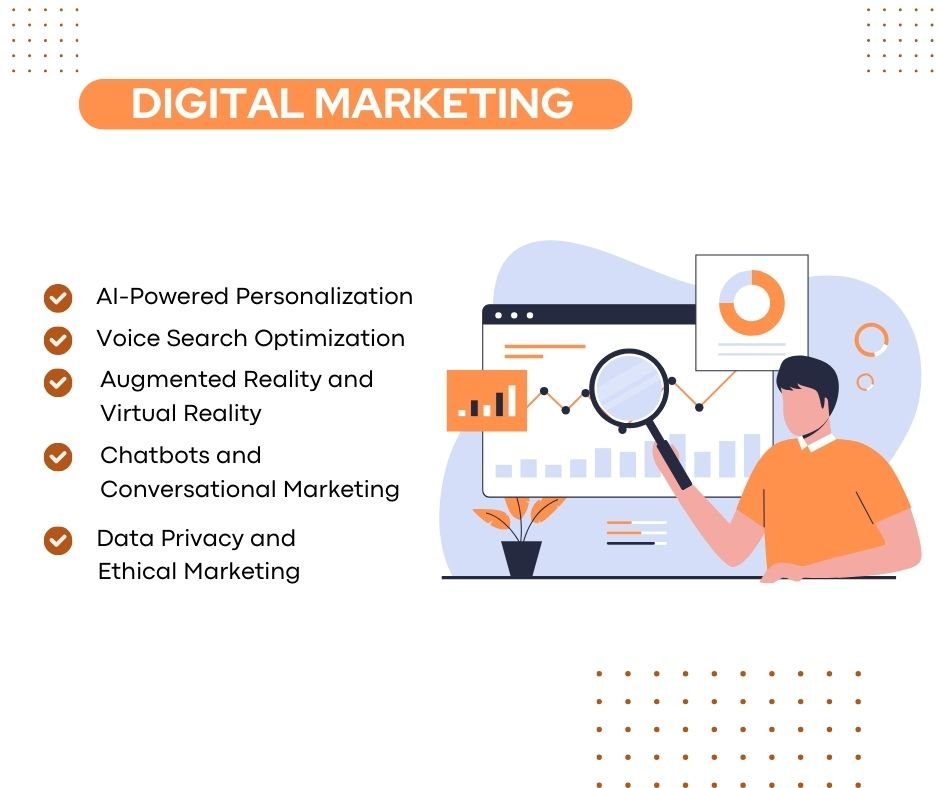With technology advancing at an unprecedented rate, marketers must continually adapt and innovate to engage audiences effectively. From AI-driven personalization to immersive experiences, the future of digital marketing is filled with exciting possibilities. In this blog post, we’ll explore some emerging technologies and strategies shaping the future of digital marketing.
Al-Powered Personalization
Chatbots have emerged as an indispensable tool in the realm of digital marketing, revolutionizing the way brands engage with customers and prospects across various platforms. These AI-powered conversational agents have become a staple in customer service, offering instant support and assistance around the clock. However, their impact extends far beyond mere customer support, as advancements in natural language processing (NLP) continue to propel chatbots into increasingly sophisticated realms of functionality.
One of the most significant advancements in chatbot technology is their ability to understand and respond to complex inquiries with a level of intelligence that closely mimics human interaction. Through the integration of advanced NLP algorithms, chatbots can decipher the nuances of natural language, comprehend user intent, and deliver contextually relevant responses. This capability not only enhances the efficiency of customer service by providing prompt and accurate assistance but also elevates the overall customer experience by creating a seamless and conversational interaction.
Moreover, chatbots are playing an instrumental role in conversational marketing, a paradigm shift that emphasizes personalized and interactive communication with users throughout the sales funnel. By leveraging chatbots as virtual assistants, brands can engage users in meaningful conversations, understand their preferences and needs, and deliver tailored recommendations and offers in real time. Whether it’s guiding users through product discovery, providing personalized shopping assistance, or facilitating transactions directly within the chat interface, conversational marketing powered by chatbots enables brands to forge deeper connections with their audience and drive conversions more effectively.
Furthermore, chatbots contribute to the optimization of marketing automation processes, enabling brands to streamline communication workflows and deliver targeted messages at scale. Through integrations with customer relationship management (CRM) systems and marketing automation platforms, chatbots can automate lead generation, qualification, and nurturing efforts, ensuring timely and personalized interactions with prospects at every touchpoint of their journey. This seamless integration of chatbots into the marketing ecosystem not only enhances operational efficiency but also enables brands to deliver a cohesive and consistent experience across multiple channels.
As the capabilities of chatbots continue to evolve and improve, their role in digital marketing is poised to expand further, offering new opportunities for brands to innovate and engage with their audience in more personalized and interactive ways. By harnessing the power of chatbots and conversational marketing, brands can elevate the customer experience, drive conversions, and differentiate themselves in an increasingly competitive landscape. As such, chatbots are not just a staple but a strategic imperative for brands seeking to thrive in the digital age.
Voice Search Optimization
With the proliferation of voice-enabled devices such as smart speakers and virtual assistants, voice search has quickly become a crucial element of the digital marketing landscape. Optimizing content for voice search presents a unique challenge compared to traditional SEO strategies due to the conversational nature of voice queries and the distinct user behavior associated with voice commands.
Unlike traditional typed searches, where users tend to input concise and keyword-focused queries, voice search queries are typically more conversational and natural in language. Users often phrase their voice queries as complete questions or sentences, seeking immediate and specific answers to their inquiries. Consequently, marketers need to adopt a different approach to optimize content for voice search and ensure their brand remains visible and competitive in search engine rankings.
One key aspect of optimizing content for voice search is the use of long-tail keywords and phrases. Long-tail keywords are more specific and reflect the natural language used in voice queries, making them essential for capturing relevant voice search traffic. Marketers should conduct thorough keyword research to identify long-tail phrases that align with their target audience’s conversational search patterns and integrate them strategically into their content.
In addition to long-tail keywords, optimizing content for voice search also entails focusing on natural language and providing concise, informative answers to common questions. When users pose voice queries, they expect direct and immediate responses that address their specific needs or inquiries. Therefore, marketers should structure their content in a way that anticipates common questions related to their products, services, or industry and provides clear and succinct answers that are easy for voice assistants to interpret and deliver.
Furthermore, optimizing content for voice search requires a thorough understanding of the context in which users are likely to conduct voice searches. Marketers should consider factors such as user intent, location, and device preferences to tailor their content to meet the needs and preferences of their target audience effectively.
As voice search continues to gain popularity and becomes an increasingly integral part of how consumers interact with technology, optimizing content for this medium will be essential for brands seeking to maintain visibility and competitiveness in search engine rankings. By adopting a strategic approach that focuses on long-tail keywords, natural language, and providing concise, informative answers, marketers can ensure their content is well-positioned to capture and capitalize on the growing prevalence of voice search.
Augmented Reality and Virtual Reality
Augmented reality (AR) and virtual reality (VR) are undoubtedly revolutionizing the landscape of digital marketing, offering brands unprecedented opportunities to engage with consumers in immersive and interactive ways. These technologies are reshaping the traditional boundaries of consumer-brand interactions, allowing marketers to create captivating experiences that blur the lines between the digital and physical worlds.
One of the key advantages of AR and VR in marketing is their ability to provide consumers with a highly personalized and engaging experience. AR applications, for instance, enable users to visualize products in their real-world environments, allowing them to try before they buy and enhancing their shopping experience. Whether it’s virtually trying on clothing or placing furniture in their living room, AR empowers consumers to make more informed purchasing decisions while offering brands a unique opportunity to showcase their products dynamically and interactively.
Similarly, VR transports users to entirely virtual environments, enabling brands to create immersive experiences that transcend traditional marketing mediums. Virtual showrooms, for example, allow consumers to explore products and services in a simulated environment, providing a level of engagement and interactivity that is unparalleled in traditional advertising. From virtual test drives for automotive brands to virtual tours of real estate properties, VR opens up a world of possibilities for brands to engage with their audiences in innovative and memorable ways.
As AR and VR technologies become increasingly accessible to consumers through smartphones, headsets, and other devices, integrating these immersive experiences into marketing strategies will become essential for brands looking to differentiate themselves in competitive markets. By harnessing the power of AR and VR, brands can capture the attention of consumers in a crowded digital landscape and create lasting impressions that drive brand loyalty and advocacy.
Moreover, the potential applications of AR and VR in marketing extend beyond product demonstrations and virtual experiences. These technologies can also be leveraged for gamification, storytelling, and brand activation campaigns, further enhancing consumer engagement and brand recall. Whether it’s through interactive AR games or immersive VR storytelling experiences, brands have the opportunity to forge deeper connections with their audiences and leave a lasting impact that extends far beyond traditional advertising methods.
Chatbots have emerged as an indispensable tool in the realm of digital marketing, revolutionizing the way brands engage with customers and prospects across various platforms. These AI-powered conversational agents have become a staple in customer service, offering instant support and assistance around the clock. However, their impact extends far beyond mere customer support, as advancements in natural language processing (NLP) continue to propel chatbots into increasingly sophisticated realms of functionality.
One of the most significant advancements in chatbot technology is their ability to understand and respond to complex inquiries with a level of intelligence that closely mimics human interaction. Through the integration of advanced NLP algorithms, chatbots can decipher the nuances of natural language, comprehend user intent, and deliver contextually relevant responses. This capability not only enhances the efficiency of customer service by providing prompt and accurate assistance but also elevates the overall customer experience by creating a seamless and conversational interaction.
Moreover, chatbots are playing an instrumental role in conversational marketing, a paradigm shift that emphasizes personalized and interactive communication with users throughout the sales funnel. By leveraging chatbots as virtual assistants, brands can engage users in meaningful conversations, understand their preferences and needs, and deliver tailored recommendations and offers in real time. Whether it’s guiding users through product discovery, providing personalized shopping assistance, or facilitating transactions directly within the chat interface, conversational marketing powered by chatbots enables brands to forge deeper connections with their audience and drive conversions more effectively.
Furthermore, chatbots contribute to the optimization of marketing automation processes, enabling brands to streamline communication workflows and deliver targeted messages at scale. Through integrations with customer relationship management (CRM) systems and marketing automation platforms, chatbots can automate lead generation, qualification, and nurturing efforts, ensuring timely and personalized interactions with prospects at every touchpoint of their journey. This seamless integration of chatbots into the marketing ecosystem not only enhances operational efficiency but also enables brands to deliver a cohesive and consistent experience across multiple channels.
As the capabilities of chatbots continue to evolve and improve, their role in digital marketing is poised to expand further, offering new opportunities for brands to innovate and engage with their audience in more personalized and interactive ways. By harnessing the power of chatbots and conversational marketing, brands can elevate the customer experience, drive conversions, and differentiate themselves in an increasingly competitive landscape. As such, chatbots are not just a staple but a strategic imperative for brands seeking to thrive in the digital age.
Data Privacy and Ethical Marketing
As the landscape of digital marketing evolves, the importance of maintaining consumer trust and respecting their privacy cannot be overstated. With the increasing reliance on data-driven strategies, marketers are challenged to balance the pursuit of personalized experiences with ethical considerations surrounding privacy and transparency. This delicate balance is further emphasized by the implementation of regulations like the General Data Protection Regulation (GDPR) in the European Union and the California Consumer Privacy Act (CCPA) in the United States, which set strict guidelines for data collection, processing, and consumer consent.
In this environment, prioritizing ethical marketing principles becomes imperative for brands aiming to build and maintain trust with their audience. These principles encompass various aspects of data collection and usage practices, including obtaining explicit consent from consumers before gathering their data, providing clear and accessible opt-out options, and ensuring the safeguarding of customer information against breaches or misuse. By adhering to these principles, brands not only demonstrate their commitment to respecting consumer privacy but also mitigate the risks associated with regulatory non-compliance and potential reputational damage.
Looking ahead, the future of digital marketing holds immense promise, driven by emerging technologies and innovative strategies that enable brands to connect with audiences in increasingly meaningful ways. Artificial intelligence (AI) is revolutionizing the landscape of personalized marketing, enabling brands to deliver tailored experiences based on individual preferences, behaviors, and interests. Additionally, immersive technologies such as augmented reality (AR) and virtual reality (VR) offer unique opportunities to engage consumers through interactive and memorable experiences.
As we embark on this exciting journey into the future of digital marketing, it’s essential to recognize that the only limit to our creativity and innovation is our imagination. By embracing ethical marketing practices and leveraging cutting-edge technologies responsibly, brands can not only drive business growth but also foster long-term relationships built on trust, transparency, and respect for consumer privacy. Ultimately, success in the digital age will be defined by our ability to harness the power of technology while upholding ethical standards that prioritize the interests and well-being of consumers.



